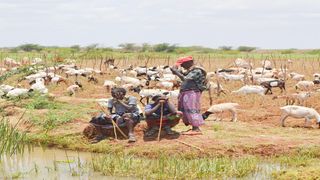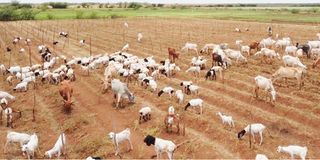
Ibrahim Saware in a red cap with his children graze their livestock in an already harvested tomato farm at the Bura Irrigation Scheme, Tana River County.
| Stephen Oduor I Nation Media GroupTana River
Premium
‘Each other’s keeper’: Bura farmers open harvested fields to herders
Ibrahim Saware has trekked 165km with his livestock in search of water and pasture.
He has lost 15 cows and 10 sheep in his tough journey, some to the drought and others to hyenas.
He walks with the pain of his losses but accepts what fate has served him.
"In that long walk, we only found one water pan and we could not draw water from it because the little that was left was toxic, but residents there were guarding it with weapons," he says.
Two of his cows refused to rise from the water pan area. He tried pestering them all in vain, and by sunset, they died, just 10 metres from the water pan.
Along with his two children, he had to keep walking and in the night, the children survived a hyena attack, and in their place, two cows were lost to the wild rangers.
Tired, thirsty and hungry, the calves fell one after the other, and so did others that were not strong enough to hold onto the struggle.
"I would cry, seeing a cow licking dust just hoping it may survive the journey only for it to fall dead after another kilometre," he narrates.
They have shared a 10-litre jerrican of water in that tough journey.
He notes that he is not the only one who has suffered the harsh effects of the drought, as he noticed several carcasses and bones on his way.
"Some herders lost more than I did," he says.
But he is relieved to have arrived in Bura, where he has met other herders who have travelled long distances.
The welcome at the Bura Irrigation Scheme is the least he expected, as it is an area of commercial agriculture.

An aerial view of livestock grazing in harvested farms at the Bura Irrigation Scheme, Tana River County.
More than 800 animals are taking refuge on the farms, where herders negotiate for pasture with farmers.
"I have been here for two weeks and mutual respect and humanity have kept the peace and stability among us, " says Abdirahman Buno, a herder.
Mr Buno expected a hostile reception but was instead welcomed by farmers, who emphatised with him and the condition of his livestock.
Some allowed him to graze his cows on farms that had been harvested while others helped him fetch dry rice stalks.
The farmers and the herding community in Bura have involved him in several meetings, where they guide him on the trends on the farms.
He has undergone orientation courtesy of the farmers, who have chosen him as the spokesperson for the guest herders.
"Some of us arrive at night with hungry cows and drive them straight into someone's farm. That has created conflict and that is why I have been appointed to guide whoever arrives here," he says.
Joseph Macharia, a farmer, notes that the herders are distressed and need support to avert further losses.
He says, like farmers, each of the herders is trying to save their property from succumbing to the prevailing harsh climatic conditions.
"If we engage them in a fight, they lose twice, so we become each other's keeper. We help them today and also incorporate them into this idea of farming," he says.
The National Irrigation Authority has created a watering corridor and harmonised grazing to avert conflicts between herders and farmers.
Bura Irrigation Scheme Manager Peter Orwa says herders have been allowed to graze on farms where crops have been harvested.
But that depends on the agreement between the farmer and the herder.
"Some farmers sell the husks and some give it for free. What we don't encourage is an intrusion into someone's farm," he says.

An aerial view of the trenches dug by the National Irrigation Authority to prevent livestock from accessing farms under production at the Bura Irrigation Scheme in Tana River County.
To prevent livestock from accessing farms with food crops, NIA has dug trenches to create a boundary.
Mr Orwa also notes that herders have been encouraged to grow pasture.
"We have introduced pasture production for the pastoralist community, where currently we have about 2.5 acres on trial and if it turns out successful we shall increase the acreage," he says.
Meanwhile, herdsmen continue to arrive at the Bura Irrigation Scheme for refuge as the drought ravages the county.





